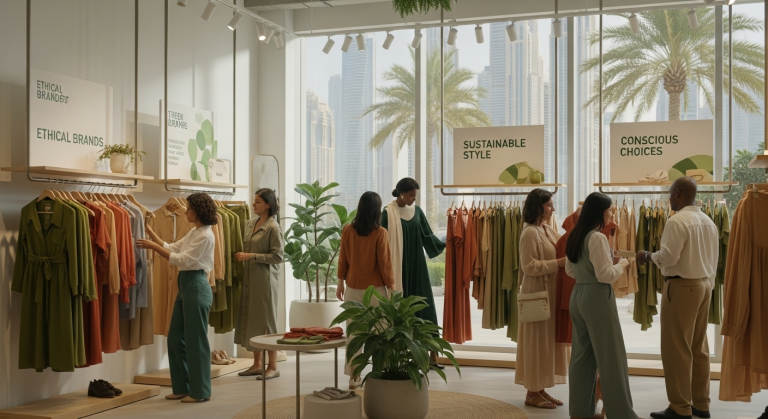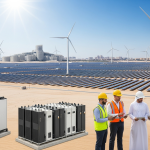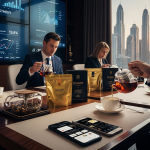Market Analysis and Opportunities
The United Arab Emirates (UAE), and Dubai in particular, offer a vibrant, fast-evolving landscape for businesses centered on sustainability. The eco-friendly fashion segment is gaining significant momentum as consumer preferences shift towards ethical and sustainable choices. With Dubai’s cosmopolitan population, high purchasing power, and policy initiatives favoring green transformation, an Eco-friendly fashion brand is well-positioned to leverage this market’s full potential.
Target Market Analysis
Dubai’s fashion industry is thriving, with the UAE fashion retail market estimated at over AED 50 billion and projected to achieve a CAGR of 7% through 2027 (Statista, 2023). Key trends shaping the market include:
- Increasing demand for sustainable products among Gen Z and Millennial consumers.
- Rising environmental awareness fueled by government eco-initiatives and global trends.
- High internet penetration and eCommerce adoption, with nearly 99% of Dubai’s population connected and engaging in online shopping.
Consumer Behavior: Research indicates that over 60% of UAE respondents in a 2023 YouGov survey stated a willingness to pay a premium for sustainable fashion, reflecting a robust market for eco-conscious brands.
Industry Trends: Digital transformation is critical for success. Leading brands in Dubai deploy advanced eCommerce platforms, leverage big data for personalized marketing, and use automation for supply chain optimization. Moreover, the UAE’s focus on sustainability, aligned with the Dubai Clean Energy Strategy 2050 and Net Zero goals, reinforces the momentum for eco-friendly fashion.
Marketing Needs
In Dubai’s competitive fashion scene, a strong digital presence is mandatory. To build visibility and capture market share, Eco-friendly fashion brands should:
- Invest in targeted market research to understand preferences across nationalities and age groups.
- Implement robust SEO strategies, leveraging keywords relevant to “sustainable fashion Dubai” and “eco-friendly clothing UAE.”
- Use paid digital campaigns (PPC), influencer collaborations, and strategic partnerships.
- Leverage social commerce through Instagram, TikTok, and Facebook to reach style-oriented audiences.
- Develop a strong brand narrative around sustainability through content marketing and storytelling.
Branding Strategies: Focus on storytelling around sustainability, certifications, and positive impact. A combination of digital advertising, influencer partnerships, and participation in eco-fashion events or pop-up shops will foster both immediate sales and long-term loyalty.
Expansion Potential
Beyond direct B2C sales, there is potential for:
- Entering adjacent GCC markets (Saudi Arabia, Qatar, Kuwait) due to similar consumer profiles and high disposable incomes.
- Launching B2B lines—supplying uniforms or merchandise to sustainably minded businesses or hospitality groups.
- Exporting made-in-UAE eco-friendly apparel by leveraging Dubai’s strategic location and logistics hub status.
Using Dubai as a launchpad, Eco-friendly fashion brands can scale quickly regionally and globally, taking advantage of Free Zone incentives and advanced infrastructure.
Comprehensive Business Overview
Eco-friendly fashion pertains to clothing brands that employ environmentally sustainable materials, ethical manufacturing processes, and transparent supply chains. In the UAE context, this sector is gaining prominence in response to regulatory incentives, evolving consumer demands, and the nation’s commitment to sustainability.
Industry, Business Model, and Operational Scope
- Industry: Fashion Retail, eCommerce, Sustainable Products
- Business Model: Direct-to-consumer (D2C) sales via online platforms and pop-up stores, supplemented by B2B partnerships for uniforms and corporate branding.
- Target Audience: Middle- to high-income eco-conscious consumers, including Emiratis, expatriates, and tourists.
- Operational Scope: The business is best situated in Dubai Mainland to maximize reach or within popular Free Zones (e.g., Dubai Design District) for industry-targeted incentives and ease of international business.
Mission, Vision, and Core Objectives
- Mission: To create high-quality, stylish apparel that respects both the planet and the people who make it, and to become Dubai’s leading sustainable fashion destination.
- Vision: To set new industry standards for sustainability across the Middle East, inspiring individuals and businesses to embrace eco-friendly fashion choices.
- Core Objectives:
- Minimize carbon footprint through ethical sourcing and manufacturing.
- Educate consumers and businesses on sustainability issues.
- Build profitable, scalable channels for eco-fashion exports.
- Support UAE’s sustainability vision and regulatory framework.
Business Stage and Location
Most new eco-friendly fashion concepts currently operate at the startup or early growth phase, leveraging Dubai Free Zones like D3 for creative talent and logistical advantages. However, mainstream adoption and scalability will likely require expansion to the Mainland for increased presence and access to a broader audience.
Competitive Advantage
Distinguishing an Eco-friendly fashion brand in Dubai requires a well-defined unique value proposition (UVP) and demonstrable strengths from multiple business perspectives.
Entrepreneur Perspective
Viability for Founders:
- Access to a thriving market with minimal direct competition in the premium eco-fashion sector.
- First-mover advantage in sustainable apparel, especially in B2B supply for hospitality, retail, and events.
- Government support, streamlined licensing, and incentives for businesses that align with Dubai’s sustainability goals.
Investor Perspective
Attractive Investment Features:
- Favorable growth rates in both retail and online fashion segments, bolstered by rising demand for ethical products.
- Potential for steady returns through multi-channel and multi-segment expansion.
- Scalability of business via franchising, regional expansion, and global eCommerce exports.
- Demonstrated success stories: Brands like The Giving Movement and Stella McCartney have gained rapid traction by emphasizing sustainability, validating the sector’s investment appeal.
Manager Perspective
Operational and Strategic Strengths:
- Proprietary workflow and supplier relationships ensure ethical sourcing and traceability.
- AI-driven inventory management and demand forecasting minimize waste and optimize sales.
- Staff training in sustainability and ethical business practices fosters brand authenticity.
Financial and Investment Needs
Financial Requirements
Launching and scaling an Eco-friendly fashion brand in Dubai requires initial capital and ongoing investment, with key cost categories:
- Setup: AED 50,000–150,000 for business registration, licensing (DED or Free Zone authorities), and initial legal/rental expenses.
- Infrastructure: AED 20,000–100,000 for office or studio space, digital platform development, and equipment.
- Staffing: AED 15,000–35,000 per month per employee for specialized staff (design, digital marketing, supply chain management).
- Marketing: AED 50,000–200,000 annually for digital campaigns, influencer partnerships, and branding.
- R&D and Product Sourcing: AED 30,000–120,000 depending on material innovation and certification costs.
Investment Potential
The eco-fashion sector in Dubai is ripe for investment due to:
- High market demand for sustainable products and green innovation.
- Potential for excellent ROI via scalable sales in both local and GCC regional markets.
- Support from local venture capital and access to international funding through Free Zones.
- Availability of various investment models—equity partnerships, convertible debt, or traditional venture capital support.
For tailored advice on maximizing investment potential and structuring deals, stakeholders are encouraged to review Investment Consulting Services at Persian Horizon.
Financial Risks and Mitigation
Key financial risks include:
- Cash flow volatility due to demand fluctuations or supply chain disruptions.
- Currency fluctuations for imported sustainable materials.
- High initial setup and operational costs, especially for product certification and digital infrastructure.
Mitigation strategies:
- Negotiate flexible supplier contracts and diversify sourcing regions.
- Adopt lean inventory models and regular cash flow monitoring.
- Secure business insurance and legal consultation to safeguard assets.
- Develop diversified revenue streams, such as workshops, consulting, or B2B partnerships.
Human Resources and Recruitment
Workforce Needs
Typical staffing for an eco-friendly fashion brand in Dubai includes:
- Creative designers and product developers with sustainability expertise.
- Supply chain managers experienced in ethical sourcing and certification.
- Digital marketing specialists skilled in content creation and SEO.
- Customer service representatives familiar with UAE cultural diversity.
- Operations and logistics coordinators.
Minimum requirements are 6–10 core team members in the startup phase, scaling up to 20–50 as the business grows.
HR Challenges and Strategies
Challenges:
- Talent competition with larger brands and international retailers.
- Retention difficulties due to Dubai’s high cost of living.
- Need for upskilling in digital and sustainability-specific roles.
Solutions:
- Offer competitive salary and benefit packages, including healthcare and performance incentives.
- Invest in ongoing training and certifications in sustainable fashion practices.
- Foster an inclusive, mission-driven culture to enhance engagement and retention.
Compliance with UAE Labor Laws
The UAE’s labor framework mandates:
- Provision of valid work visas and residence permits for all expatriate employees.
- Clear employment contracts outlining remuneration and benefits.
- Compliance with end-of-service gratuity and labor insurance standards.
For legal compliance, regular audits and consultation with local HR/legal teams are recommended. Full compliance also ensures positive public perception and brand integrity.
Infrastructure and Operations
Infrastructure Needs
- Physical offices or design studios, preferably within Dubai Design District (D3) or cost-efficient co-working spaces.
- Modern eCommerce infrastructure with cloud-based ERP and CRM systems.
- High-quality warehousing and logistics for both local and overseas supply chain management.
- Renewable energy sourcing and waste reduction systems where feasible.
Operational Optimization
Potential weaknesses:
- Inconsistent supply chains for certified eco-friendly materials.
- Inefficient manual order or inventory management processes.
- Lengthy procurement cycles due to international sourcing requirements.
Recommended improvements:
- Implement ERP and supply chain software for automation and real-time visibility.
- Develop standardized vendor qualification procedures to ensure ethical sourcing.
- Partner with local logistics companies focusing on sustainable delivery models.
Legal Compliance
YKey legal requirements include:
- Company registration with the Dubai Department of Economic Development (DED) or relevant Free Zone authority.
- Valid trade licenses and operational permits for retail and eCommerce.
- Corporate bank account compliant with UAE regulations.
- Adherence to local tax laws and value-added tax (VAT) registration.
It is crucial to regularly update licenses and work with experienced service providers. For streamlined business setup services in Dubai, consider leveraging experienced partners like Persian Horizon.
Innovation and Technology
Digital enablement in the eco-fashion sector includes:
- Utilizing blockchain for supply chain transparency and product traceability.
- Leveraging AI for predictive analytics in inventory and customer trends.
- Adopting digital design tools to accelerate prototyping and reduce material waste.
Recommendations:
- Invest in scalable, cloud-based systems adaptable to rapid changes in demand or regulatory requirements.
- Explore partnerships with tech startups for wearable technology or digital loyalty programs.
Marketing and Branding Strategies
Brand Status
Strengths often include:
- Clear commitment to sustainability resonating with Dubai’s environmentally aware consumers.
- Strong visual identity focused on minimalist, modern aesthetics.
Areas for improvement:
- Enhancing brand storytelling through multi-lingual campaigns (Arabic, English, Hindi).
- Increasing media presence by participating in Dubai Fashion Week or local expos.
Marketing Channels
Current focus:
- Instagram, TikTok, and Facebook for reach and engagement.
- SEO-optimized eCommerce platform with user-friendly design.
- Email newsletters and influencer partnerships for targeted marketing.
Suggested optimizations:
- Explore influencer collaborations with micro-influencers in sustainable fashion.
- Deploy PPC ads targeting “eco-friendly fashion Dubai” and “ethical clothing UAE.”
- Engage in PR activities, leveraging local and regional media.
360-Degree Campaigns
Multi-channel integrated campaigns should encompass:
- Social media blitzes synchronized with eco-awareness events.
- Email marketing with exclusive previews and educational content.
- Physical pop-up shops and fashion shows in key Dubai malls or landmarks.
- Partnerships with sustainability NGOs and government initiatives to build credibility.
For guidance on sophisticated marketing strategies and campaign execution, visit the Sales and Advertising Services page.
Growth and Development Potential
Growth Strategies
Robust growth in Dubai can be achieved by:
- Expanding into regional GCC markets using Dubai’s logistics and trade capabilities.
- Launching exclusive, limited-edition collaborations with local artists or influencers.
- Developing omnichannel sales—integrating physical retail experiences with strong eCommerce offerings.
- Pursuing strategic partnerships with major retailers, hospitality, and tourism operators focused on sustainability.
Networking
Effective networking is critical in Dubai’s relationship-driven market. Opportunities include:
- Engagement with business councils, such as the Dubai Chamber of Commerce.
- Establishing relationships with sustainable supply chain partners and eco-certification agencies.
- Leveraging platforms like Persian Horizon, which offers guidance and connections across 57 countries, facilitating supplier, investor, and governmental links.
International Potential
Dubai is an ideal launchpad for international expansion due to:
- World-class logistics enabling fast access to markets in Europe, Asia, and Africa
- Tax-free business environment and Free Zones catering to export-driven enterprises.
- Reputation as a global fashion and innovation hub attracting buyers and business partners.
Leading brands have used Dubai’s base to export to markets across the GCC, Europe, and Asia—an opportunity for any new entrant to emulate.
Sustainability and Innovation
Eco-friendly fashion brands must continuously innovate by:
- Procuring organic or recycled materials and minimizing use of plastics or harmful dyes.
- Educating consumers about the lifecycle of products via digital tools (QR-code traceability, AR visualization of impact).
- Aligning practices with Dubai’s Vision 2030 for sustainable urban development.
Such initiatives offer both marketing appeal and genuine operational advantage in an environment increasingly shaped by regulation and consumer pressure for greener businesses.
Alignment with Dubai’s Market
Cultural Alignment
Dubai’s society is incredibly diverse, with over 200 nationalities residing and working in the city. The Eco-friendly fashion brand should therefore:
- Offer diverse sizing, designs, and modest options suitable for various cultures and backgrounds.
- Deploy bilingual or trilingual marketing materials to maximize reach in Arabic, English, and Indian languages.
- Host inclusivity-centered events and workshops to build grassroots community support.
Local Regulatory Compliance
Strict compliance with Dubai’s commercial, tax, and labor regulations is non-negotiable. Key points include:
- Obtaining and annually renewing trade licenses and relevant product certifications.
- VAT registration, transparent tax accounting, and regular reporting.
- Adherence to advertising and social media regulations for branded communication.
Any compliance gaps should be swiftly addressed via consultation with UAE legal professionals and regular policy reviews.
Advantages of Dubai
Operating an eco-friendly fashion business in Dubai brings several strategic advantages:
- Zero or low corporate taxes and no personal income tax.
- Modern logistics and globally connected trade infrastructure.
- Access to some of the world’s top events, such as Dubai Fashion Week, Expo 2020 legacy events, and high-profile sustainability exhibitions.
- Government incentives for businesses aligned with sustainability and innovation goals.
Local Challenges and Solutions
Challenges:
- High competition from international brands present in key retail locations.
- Operational costs (rental, salaries) are above global averages.
- Consumer education: Achieving market penetration often requires sustained efforts to educate prospective buyers on the value of eco-friendly fashion.
Solutions:
- Focus on digital channels and direct-to-consumer models to reduce dependency on costly retail space.
- Conduct ongoing educational campaigns and offer immersive brand experiences.
- Leverage local partnerships (pop-ups, exhibitions) to maintain high visibility while managing costs.
Conclusion and Recommendations
Dubai represents one of the premier locations globally for launching and scaling an Eco-friendly fashion brand. The business opportunity combines strong market demand, government support for sustainability, and unmatched connectivity for regional and international expansion. However, success requires a considered entry strategy, from securing digital advantage and regulatory compliance to recruiting skilled teams and building a compelling, inclusive brand identity.
Entrepreneurs should carefully assess operational needs and tailor their offerings to Dubai’s diverse population. Investors will find the sector attractive due to scalability, innovation, and alignment with UAE’s Vision 2030. Managers can drive operational efficiency through technology and robust supply chain partnerships.
For personalized guidance, investment consulting, and turnkey business setup in Dubai, stakeholders are encouraged to connect with Persian Horizon, whose expertise ensures your eco-friendly fashion venture not only launches successfully but thrives in one of the world’s most dynamic markets.
Ready to seize the next big Dubai business opportunity? Explore Persian Horizon’s full suite of services for expert support and step confidently into the future of sustainable fashion in the UAE.







